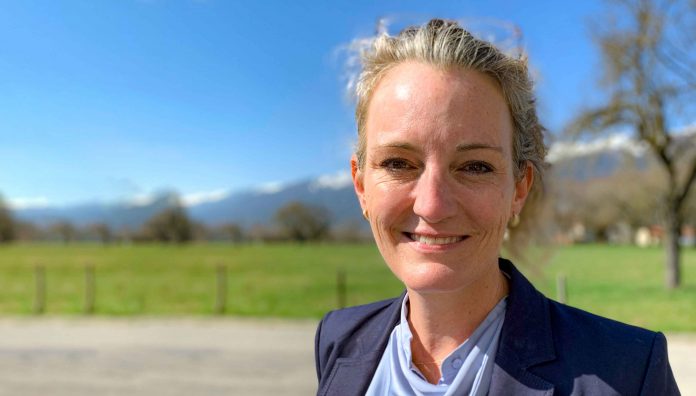Bernadette Cappello MPS has gone from community pharmacy, through the federal Department of Health to the World Health Organization in Geneva.
What led you into pharmacy initially and what were your aims?
I was 7 years old when I decided I wanted to be a pharmacist. My parents encouraged my career plans – that certainly helped. I got my start as a pharmacy assistant when I was 13 and never wavered from my goal. (I still have the reference from that first job, which refers to my youthful ‘ambition’). After graduating, I worked as a community and consultant pharmacist in Canberra for 13 years. Goal achieved.
You moved, then, to the Pharmaceutical Benefits Advisory Committee?
It was a huge career change; the juxtaposition of a pharmacist and a civil servant. I’d moved away from the front-line pharmacist/patient interface. Eventually, I realised I was helping a larger number of people access affordable medicines and that was very professionally satisfying and fulfilling. And I learned a lot. Despite working for so long delivering medicines to patients through the PBS, I knew little of the evidence-based mechanism behind the inclusion of medicines on the PBS.
How did you wind up at the World Health Organization (WHO)?
A close colleague at the PBAC, who had previously worked for WHO as secretary of the Essential Medicines List expert committee, kindly introduced me to her WHO contacts and recommended me for a position there based on my experience and skill set. I moved to Geneva (well, actually to a small village in neighbouring France) in October 2014 with an initial 6-month contract as a pharmacist with the Essential Medicines team, responsible for the revision and updating of the EML. I have been here ever since.
What are the biggest challenges adapting to global, rather than local needs as a pharmacist in this position?
Recognising the different national priorities, disease burdens and health system capacities to provide access to quality, affordable essential medicines. Regional representation and perspectives from countries of all income levels is critical to recommendations for the inclusion of medicines on the EML. It is a global tool to support countries in the development of their national essential medicines and reimbursement lists, but there is no true ‘one size fits all’ at the global level. [Availability and affordability of medicines in different settings can vary hugely.]
An essential medicine that is easily accessible and affordable for patients in Australia may be completely out of reach for patients in a low- or middle-income country. Working to make such a medicine accessible and affordable globally is a big challenge. Including a medicine on the EML is an important step in helping achieve this.
Are you working amid COVID-19 shutdowns?
Yes. The majority of WHO staff in Geneva are currently required to work from home. Alongside the emergency response, the normative work of WHO will carry on, just under rather different circumstances.
Any tips for working for WHO or any overseas organisation dealing with medicines?
Consider further study and don’t necessarily limit yourself to medicines. Learn one (or more) official UN language. Watch the UN Jobs website and others for non-government organisations (e.g. Médecins Sans Frontières). Develop and expand your professional network. Read voraciously. Don’t be scared.
DAY IN THE LIFEA typical day for Bernadette Cappello, Technical Officer/Pharmacist, WHO Essential Medicines List Secretariat6.00 am (CEST): Cross the border Use convenient time difference with Australia to connect with family, friends and manage Australian-based life administration. YouTube yoga. Drive across the French border to WHO headquarters in Switzerland. 8.00 am: Coffee-charged meetings Respond to emails. Join EML team meeting (invariably over coffee) to coordinate work on current activities, like the upcoming EML expert working group meetings on cancer medicines and antibiotics. 11.00 am: Administration Deal with necessary administration tasks. Have another coffee. 12.00 pm: Current projects Meetings, conference calls, reading, research and technical reviews of special projects. Current projects include reviews of age-appropriateness of medicines formulations for children and therapeutic interchangeability of EML medicines within the same pharmacological class. 2.00 pm: EML-related activities Plan and execute meetings of the EML expert committee and its specialised working groups; collaboration with other WHO technical departments (e.g. non-communicable diseases, HIV, TB, reproductive health) to identify new medicines for potential EML inclusion; review and provide feedback on EML submissions from internal and external stakeholders; support WHO’s Member States when they review and update national EMLs; and more … 6.30 pm: International calls Mutually reasonable time for Skyping a US-based consultant for update on paediatric formulations project. Briefly watch colours change on Mont Blanc as sun sets. Pinch myself. Head home to France. 8.00 pm: Language upskilling Work on improving embarrassingly bad French with Skype lesson, the Duolingo app or a podcast. |
Further resources
Want to find out more about different career pathways for pharmacists? Visit www.psa.org.au/careerpathways



 John Jones MPS, pharmacist immuniser and owner of My Community Pharmacy Shortland in Newcastle, NSW[/caption]
John Jones MPS, pharmacist immuniser and owner of My Community Pharmacy Shortland in Newcastle, NSW[/caption]


 Debbie Rigby FPS explaining how to correctly use different inhaler devices[/caption]
Debbie Rigby FPS explaining how to correctly use different inhaler devices[/caption]




 Professor Sepehr Shakib[/caption]
Professor Sepehr Shakib[/caption]

 Lee McLennan MPS[/caption]
Lee McLennan MPS[/caption]
 Dr Natalie Soulsby FPS, Adv Prac Pharm[/caption]
Dr Natalie Soulsby FPS, Adv Prac Pharm[/caption]
 Joanne Gross MPS[/caption]
Joanne Gross MPS[/caption]





